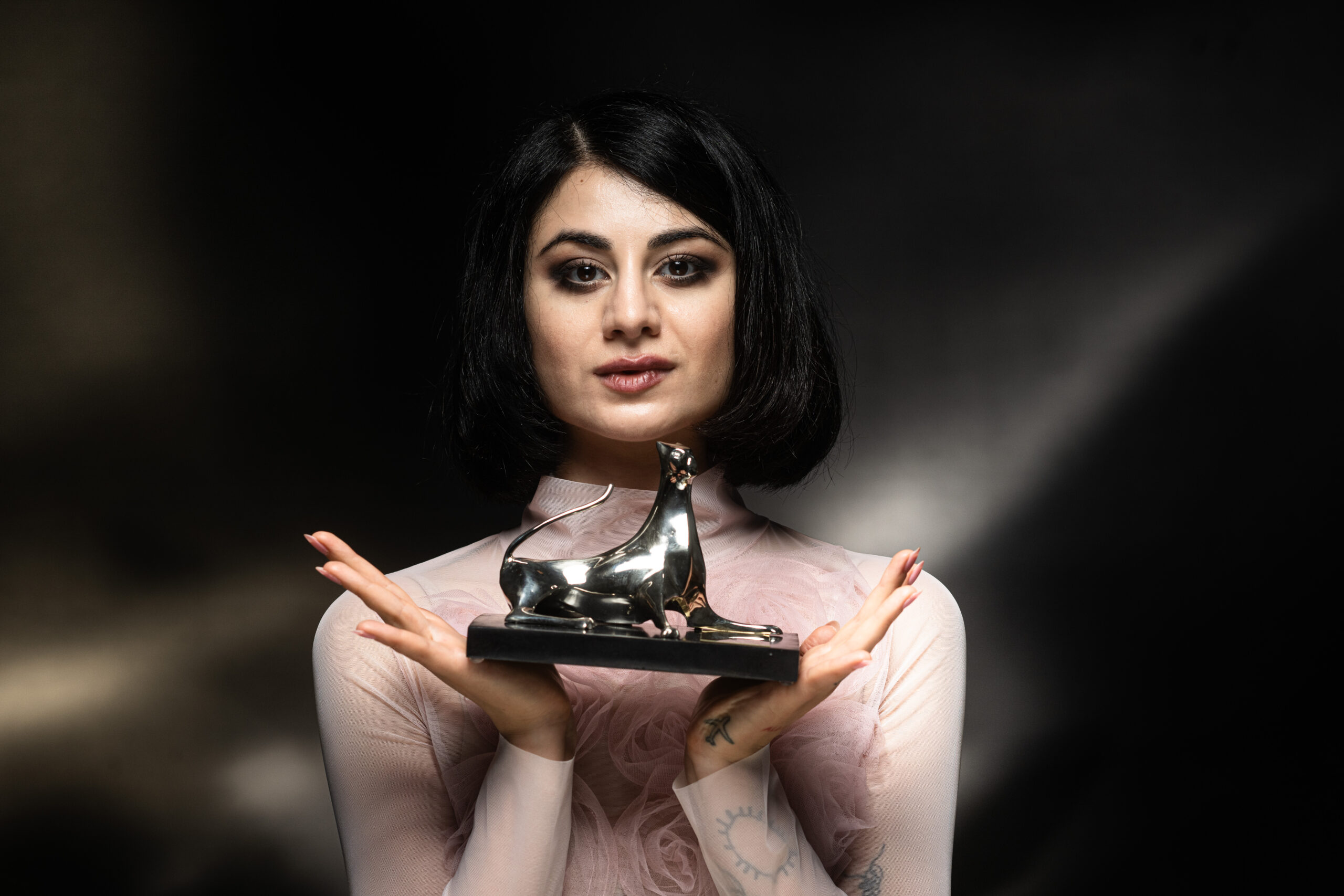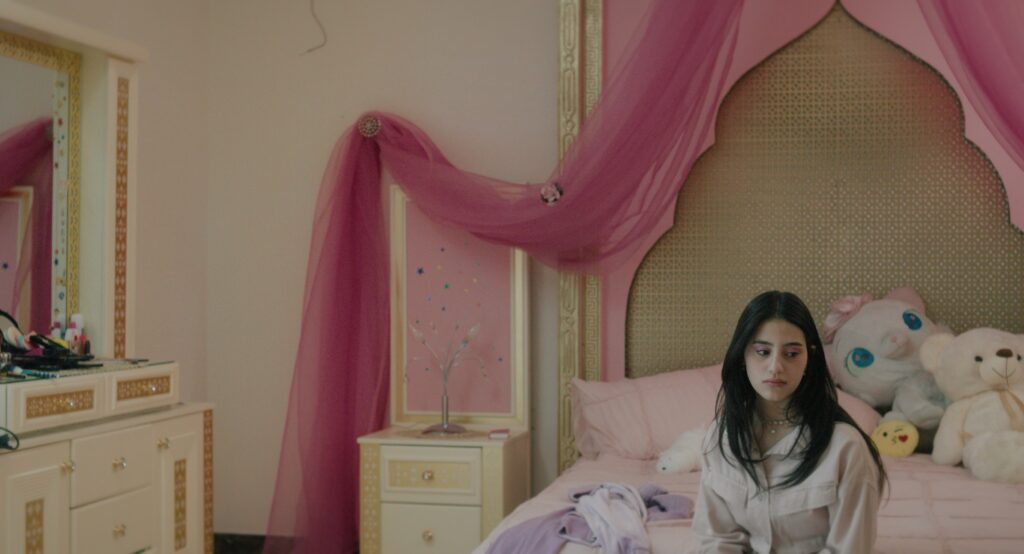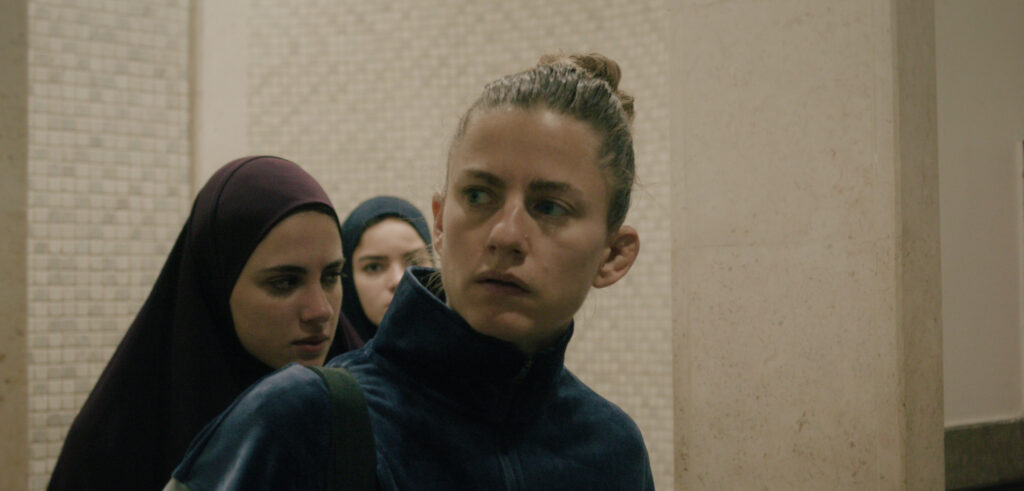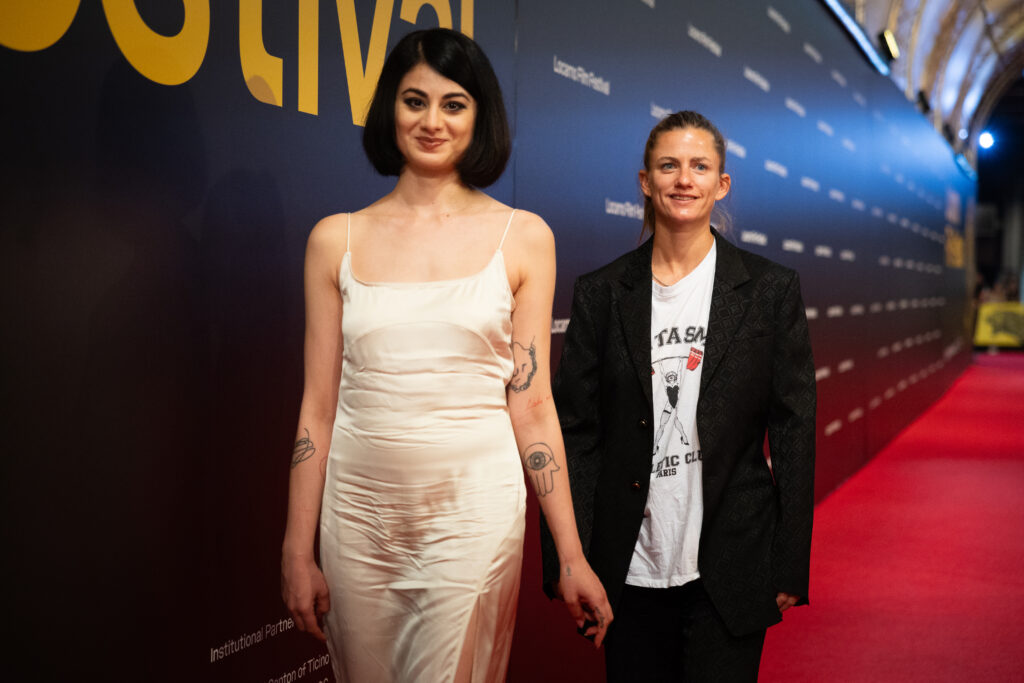Interview with Kurdwin Ayub about the film “Mond,” Locarno Film Festival 2024

Based on a story that brings to mind Dubai’s captive Princess Latifa, Iraq-born, Austrian-based director Kurdwin Ayub’s second film, “Mond” (Moon) just had its world premiere at Locarno Film Festival in the International Competition and picked up the second most important award, the Special Jury Prize. It’s an enigmatic thriller that follows Sarah, a Western martial artist (played by Florentina Holzinger, a well-known choreographer and performance artist in Austria), who is hired to train three Jordanian sisters in their impressive palatial home that they hardly ever leave, giving the feeling of a huis clos once things get going.
The teenage sisters, Shaima (Nagham Abu Baker), Fatima (Celina Antwan), and Nour (Andria Tayeh) are memorable in their roles, the lives they lead being almost completely deprived of freedom. With the exception of some visits to a luxury shopping mall, the sisters have no contact with the real world, they are homeschooled and prohibited from internet access. Far from coming across as privileged, the sisters arouse in the audience a strong sense of pity.
The naive Sarah has no idea what she lets herself in for when she is asked to sign a non-disclosure agreement and this is the first sign we get as an audience that things are not what they seem in the privileged world of these princesses.
Kurdwin Ayub literally played with fire in setting up this story in which we witness a frontal confrontation between two very different cultures, two very different ways of being in the world as a woman. This is cleverly rendered visually in the training scenes where we see Sarah on one side kickboxing with the sisters, on the other side. One of the sisters is not so keen to engage in the fight, her reluctance speaking volumes about her defeatist mindset. Another sister is more rebellious. All three of them are very well differentiated, each pointing to a different attitude.
Casting for these roles in Jordan was very difficult as most of the young women who showed up did so in secret since acting, at least for women, is taboo for many families. To the director’s surprise, she never heard from them again. The problem was only solved when Andria Tayeh, a well-known model and influencer in the Arab world, and more recently an actor in the series “AlRawabi School for Girls” from Netflix, was cast in the role of Nour.

“Mond” was produced by veteran Austrian auteurs Ulrich Seidl and Veronika Franz. Apart from the Special Jury Prize, Ayub also received the Europe Cinemas Label prize, as well as a special mention from the Ecumenical Jury. All these accolades are nothing new for the director whose debut “Sonne” won her the Best First Feature award at Berlinale in 2022 and a plethora of other prizes at subsequent film festivals that year.
The following interview with Kurdwin Ayub took place in Locarno on the 13th of August 2024.
Dana Knight: The film’s novel subject matter is obviously connected to your unique background, you have a strong connection to two very different cultures.
Kurdwin Ayub: Yes, and this is the reason why I think I have to do this kind of film because nowadays you’re not able to do certain cultural subjects, like other people’s culture, so I see it as my job now to portray both of these worlds. Specific things about these worlds.
DK: I know your parents moved from Iraq to Austria when you were a baby. What could you tell me about your upbringing?
KA: It was the Golf War in 1991, my parents fled from the war, I was a baby, I had a baby sister too but she died in the war. It was very traumatic for my mother. My upbringing was weird because of the trauma my parents endured, we were pretty poor, we were given social housing in the suburbs. My parents were doctors in Iraq but they had to study medicine again in Vienna. So I grew up in Vienna. I love my parents very much but …my father was very patriarchal and I was not allowed to do anything, really anything. And that made me very rebellious. I remember a moment when I told my German teacher, I wrote an essay about how awful I felt, like in a cage somehow. And his answer was, “Maybe you have to find hobbies.” And I guess this is somehow like the story in the film.

DK: This is very surprising as I expected your upbringing to be more aligned with Western values.
KA: In a way it was. But my father was brought up in a different world, I guess that’s the reason why. Then all the trauma from the war. And after I broke out, I packed my things and moved away, and I needed a really long time until I reconnected with my father. That’s the story of my documentary “Paradis! Paradis!” when I went back to Iraq.
I went back to Iraq many times, in my childhood, in my youth, not during the war obviously. But this time I went there alone with my father, I was 22 until I was 25, and that’s when I realized my father is like me and he had his problems, that’s why he was so tough on me. And he is like I am in Austria, he felt like an alien with his family in Iraq. And we became best friends after that. And now he’s a feminist in Iraq!
DK: These autobiographical details you just shared suggest that your POV in the story is split between the two sides, that of Sarah, the Austrian trainer, and the Jordanian sisters she is tasked to train.
KA: Yes, it’s both. When I go to Iraq I see my cousins don’t have the same rights I have in Austria. Of course it’s better than twenty years ago. But there are issues, like when we talk about sexism, because we love to talk about sexism in the Western world. And we also have to talk about it in Middle Eastern countries. Sexism is still an issue over there and I see it through Sarah’s perspective, which is weird. I have both perspectives.
DK: What are your strongest memories of Iraq that informed the film? Things that maybe shocked you going back?
KA: I think the most shocking things I put them more in my documentary. For my documentary I have been to the war zone, and witnessed the fight against Isis. There I saw those young boys, only 18, thinking they are action heroes, fighting against something very evil. But they were so young. One memory that stayed with me was when we were on the front line, they said they cooked something for us but we could not eat it, we had to leave, we were not allowed to be there after dark. And a few months later I still remembered I didn’t eat their food. I wish I stayed and ate the meal they made with their hands.
Also as child going back to Iraq, I remember I was friends with a little lamb, then they killed it and we ate it. It’s things like this. Or again when I was a small child, I remember they put all the children in one room and they washed us. And I was so shy, we were all naked. But it’s normal there.
DK: Apart from your cousins, do you have many friends in Iraq?
KA: I actually made a lot of friends in Jordan because now during Corona I couldn’t go back to Iraq that much so I went to Jordan, also for filming. And I realized that the Kurdish area in Iraq is very similar to the more liberal areas in Jordan. Because South Iraq is very hard on women and politically. The Northern area is more liberal and closer to Jordan and the Palestinian way of life. So I met a lot of women filmmakers and I’m still friends with them. Sometimes I feel like in the movie “Madagascar 2,” when the zebra goes back to Madagascar and he sees a lot of zebras for the first time and they are all like him. So it felt a lot like that! I mean, when I go back to Iraq I see my cousins but they don’t have the same artistic interests like me, but when I went to Jordan the women I met had the same passions that I have. They were on the other side of the border but the same as me.
DK: The differences between the two cultures are so salient, what would you say the similarities are?
KA: The similarities between the cultures are how we women were brought up, what we have to be like. We have to be mothers, we have to be pretty, we have to be fighters and strong. We have to be good for the family. These are issues that you find everywhere.
DK: Patriarchy is the same, everywhere.
KA: Yes, we still have people kept away in cellars in Austria, you know those stories…I wanted to make a movie to show that the only difference is that in Europe we have the privilege to go away, and they don’t.
DK: I felt that everything the sisters say and do in the film has strong connotations. For instance, one of the sisters is reluctant to engage in the training, on account of feeling sick. This can be interpreted as a reluctance to defend herself, a reluctance to engage in the fight, the women’s liberation. Is this what you tried to convey?
KA: In general, yes, there are women who accept their situation. But there are others who don’t. Also, Sarah herself acts very passively sometimes, she’s quite similar to Shaima in many ways, the sister who’s not willing to engage in the training.
DK: There are also many paradoxes, for instance the sister who has Botox done. She’s young, beautiful, she clearly does not need it. So does she do it because this is a freedom that is actually allowed to her and she’s willing to grab any freedom she can have?
KA: Yes, precisely. It’s also like the girls in Austria who say at the end: “I wanted to do my nose.” It’s a general thing, you can see it’s over there and it’s over here. It’s an act of freedom but also some kind of violence, every character in the movie is connected to a specific violence, towards themselves. And it’s better if you choose it then if you don’t.
DK: The theme of mental illness looms large in the film, it brought to mind “Jane Eyre.” That’s set in the Victorian era and it says a lot about repression in the culture.
KA: There is also the problem of not having a hospice, it’s better to keep those people at home. From Jordan to Austria. In the film, Sarah’s sister, who is a mother, is also very stressed and depressed. Mental illness is a problem everywhere, people don’t know how to deal with it. For this particular family in the film, mental illness is a taboo, a shameful thing.
DK: We have the savior figure in the film, one way to interpret that is that women’s liberation in Muslim countries is conceived as impossible without outside help, that the repression is too strong. Is this what you tried to convey?
KA: I think I tried to convey that it’s not possible from the outside either. I wanted to play with the fact of the white Western savior. In all of the movies we see, there is the female or male character who goes over there and saves all of them. And in my film this is not working because it’s very naive. And it’s very quickly not working. It’s very naive of Sarah as well, not only of the sisters. It’s naive for them to think that the Western fighter from the outside could be a solution … I basically wanted to show both sides of the white savior story. People over there think and hope that people in Europe will go and save them. But the solution must come from within.
DK: There is a shocking scene in the film, you’re literally playing with fire on the set. How was this technically done, did you use a stunt person or is it CGI?
KA: Actually both. At the beginning we used a visual effect and after that we had a stunt person. From the beginning we wanted both. And yes we had actual fire on the set, and with this fire we built the CGI after. But we did it in a studio, we built the whole kitchen, the stunt woman was very professional. We did the fire scene in Austria. Every scene in the movie that takes place in Jordan was shot there, except for the fire scene that takes place in Jordan but was shot in Austria. It was actually a huge project, very difficult.
DK: Everything in the film seems so loaded with meaning, how long did the writing of the script take?
KA: I don’t know, it all comes out when I write and then I adapt it again and again and again and try to make it better. I guess it took me a few years to arrive at the final script for this film.
DK: Did you go to many screenwriting labs with it?
KA: No, I had the help of Veronika Franz and Severin Fiala, they are my dramaturgists and producers and they gave me a lot of advice, also for my previous film.
DK: What did you learn from them?
KA: Stuff like dramaturgical advice, like how to lead a story, how to make things logical, or better. How to keep away one thought of the audience and play with the audience’s mind … The editing was also a long process. For me, the writing and the editing are very important. When you write something it’s one film, when you shoot it, it’s another film and when you edit, it becomes what you wanted but also a new film.
DK: Urich Seidl came on board in the production, did he also give you advice?
KA: Yes, he had his own opinions and views. He said, “Don’t make it too classical.” He is very artsy.
DK: The title of the movie means “moon,” which has connotations of reverie, fantasy, longing. Is that connected to the longing these women have to be free, or is that connected more to your previous film which was called “Sun?”
KA: It’s connected more to my previous film, I wanted “Mond” to be the opposite of “Sonne” (Sun). I wanted to show the dark side of it. It’s also connected with the half-moon in Islam. I always play with this kind of stuff and then break it a bit. Because you expect something with Islam, oppression from Islam. And stuff like that. And then it’s not. The sisters actually put on their scarves when they try to escape. And Sarah’s friends in the movie at the beginning make very racist jokes about Jordan and Muslim people, about headscarves and hijabs. And then I show that in Jordan it’s not Islam, it’s normal patriarchy, like everywhere, like here, like in the US. I wanted to play with that.
DK: The dialogue you mention is very “politically incorrect.” Could you tell me your thoughts on the importance of this kind of dialogue, is it in order to provoke?
KA: Yes, and I had this instinct to use it. Because the world is politically incorrect and we have to show that. If we make movies that show us a version of the world that is correct but not real, it’s another movie. And I don’t make these kinds of movies. Those movies are ok though but they are like a fantasy, they are nice, I sometimes watch movies like that. But when you watch my movies you get triggered and you don’t feel nice and that’s also ok because the whole concept of the movie is what the audience feels after that, and what they think, maybe they discuss and fight with each other. It’s good to talk about these subjects.

DK: Talking about political correctness in the film world, the requirement to have parity between female and male filmmakers in festivals, how do you feel about that? For instance the Cannes competition is often criticized for not reaching this worthy goal, whereas if you look at the Locarno competition, parity is easily achieved.
KA: Oof, that’s a complex issue. I know that festivals need to get stars and famous filmmakers. And yeah in Cannes there aren’t many women filmmakers. But the thing is there are a lot of good films by women. A lot. And if festivals are thinking about inviting all the best films, then the numbers would be equal. So I don’t think we need to say we have this and this number, we just have to choose what is interesting and what is good. Then you realized very quickly that the situation might be actually bad for men (laughing). Because I realized that a lot of good movies are made by women.
DK: Or at least the good movies that we as women connect more with.
KA: Exactly and that’s the reason why I think gender parity will happen, at least one day, when all the old male filmmakers die away and they make room for something else. I understand why big festivals have to get their old stars, like Francis Ford Coppola, I get it. But when they die away, there will be room for us.
Unlike Cannes, Locarno does not need stars, it’s an arthouse festival, Locarno has a love for art and then gender parity happens.
DK: What are your expectations from the film’s reception in Muslim countries? I expect you’ll go to the Red Sea Festival, Egypt…
KA: Yes, I’m wondering about that myself. My previous film Sonne was very provocative. And I was naive and scared of what the people there would say. Like in Saudi Arabia. But these Muslim countries have their liberal people, their developed art culture and they have their fighters and their rebels. So when I show my movies there it’s cool for them. It’s not like they’ll throw bombs on me, that’s a cliche. They will be provoked of course. But also Austrian audiences will be provoked when I show a naive Sarah and racist friends and a weird girl in Austria. The conservative nationalists will be provoked probably. But there are a lot of women, men and queer people who love this kind of films, that set something free.
DK: Can art or cinema change the world?
KA: I don’t know, the world sucks very much right now. I don’t know where we went off. But we can try.
